Resources
5 min read
Elasticsearch is a distributed search and analytics engine that provides real-time operations and scales Horizontally. This assists users in making quick and effective searches, as well as analyzing, and visualizing huge data volumes. Users commonly commend Elasticsearch for its data indexing and storage capabilities. They highlight its efficiency in indexing text data and its proficiency in managing large data sets for persistence and retrieval. Additionally, Elasticsearch's robust search and query features receive frequent praise. Users find the process of setting up custom queries straightforward, particularly when using frameworks like Spring Java.
While numerous Elasticsearch users have gained from these advantages, not all have shared this favorable experience. One of the tool's major drawbacks is that users have installation and configuration particularly complex, especially while upgrading to a higher version. This is a significant disadvantage of the tool due to the regularity that the platform rolls out upgrades, which involves updating the whole team’s data.
In addition to this, another issue that users have encountered with Elasticsearch is that the documentation is not up to expectations, with one stating that ‘the documentation is simply not good enough.’ With these documents, it’s reported that basic information is overlooked and some important aspects are missing entirely. This leaves users dissatisfied with the solution as there’s already a steep learning curve for Elasticsearch and the lack of high-quality documentation prevents users from gaining from the tool.
These issues of Elasticsearch have led to numerous users searching for a more effective alternative that better serves their organization. However, this process can be complex and time-consuming. So, to assist you with this, in this article we will outline the best Elasticsearch alternatives.
Contents
Elasticsearch: Key Features
- Real-time Search and Analytics: Elasticsearch enables near real-time indexing and search. This is helpful in applications where timely access to updated information is paramount.
- Distributed Architecture: Elasticsearch is designed to be distributed meaning it offers horizontal scalability. It holds large amounts of data by adding nodes to the cluster, allowing it to handle enormous volumes of data and query loads.
- RESTful API: It exposes an easy and strong RESTful API for system access, making it easy to integrate with other applications and tools.
- Schema-Free JSON Documents: The data model of Elasticsearch is flexible, where JSON format documents are stored in a schematic-less fashion. This means users can index your data without defining any schema in advance.
- Powerful Query Language: Elasticsearch includes a powerful query DSL (Domain Specific Language), to form and execute complex, fine-grained queries. Using it, users can then search full-text, conduct structured searching, and analytics, all in a single query.
- Integration with Logstash and Kibana: It's often used in conjunction with Logstash and Kibana as part of the Elastic Stack, formerly known as the ELK Stack. Logstash is used for data ingestion and transformation, and Kibana is a visualization tool that sits atop Elasticsearch to provide powerful insights and dashboards.
Elasticsearch Alternatives
Logit.io
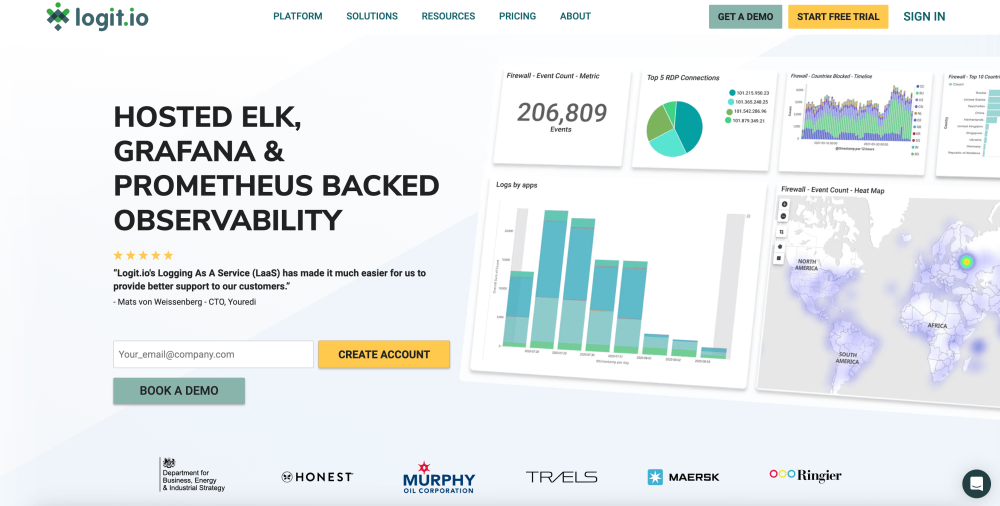
Logit.io is a powerful and cost-effective observability platform that provides Hosted OpenSearch for simple and effective search and querying. With Hosted OpenSearch from Logit.io you can gain all the best features of the solution but without all the complex configuration and updates as this will be managed by us. This ensures you always have the latest version of OpenSearch and can focus on searching your data.
Hosted OpenSearch from Logit.io provides the flexibility to query your data in the way that best suits your needs. Whether you are performing simple keyword searches or complex queries, OpenSearch adapts to deliver accurate results every time. Additionally, you can confidently protect your sensitive data with Managed OpenSearch's robust security features. These include encryption, access controls, and audit trails, ensuring your information remains safe and compliant with leading industry regulations.
Request a Demo
Want to learn more about Logit.io's powerful observability platform? Book a demo and we'll walk you through the extensive capabilities and discuss your requirements in detail.
Typesense
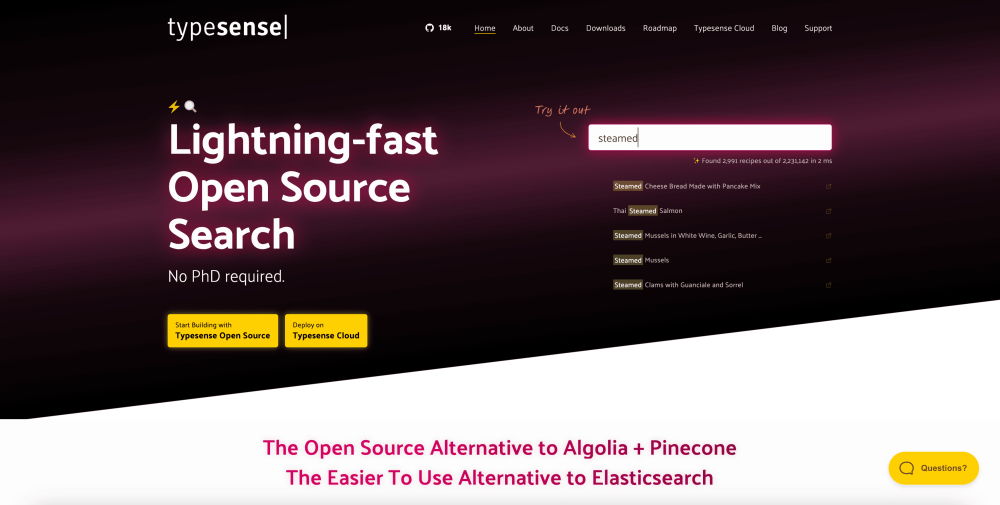
The first tool included in our list of Elasticsearch alternatives is Typesense, an open-source, cloud-based platform built for low latency and ease of use that has been utilized by organizations of all sizes. The solution offers the ability to automatically try to correct typos, effectively tailor your result via flexible and fast query-time ranking, and automatically generate embeddings using built-in ML models or OpenAI / PaLM API.
Meilisearch

Meilisearch is another open-source solution that operates as an effective Elasticsearch alternative. This solution is a fast and hyper-relevant search engine that fits effortlessly into your workflow. It offers plug-and-play with zero configuration to search your data, enabling you to deploy the tool in a matter of minutes. Also, Meilisearch supports all languages and detects them automatically. Lastly, you can improve your user's search experience with custom filters and build a faceted search interface in a few lines of code.
Algolia

Algolia is a hosted search engine service known for its speed, relevance, and easiness of integration. It provides real-time search with instant results, improving user experience. Key features include robust as-you-type search, relevance algorithms tunable for business requirements, typo tolerance, multi-language support, and in-depth analytics. Algolia offers robust security, too, with encrypted search, granular access control, and compliance with industry standards.
Quickwit

Quickwit is the next-gen search & analytics engine built for logs, it can be deployed in your existing environment, on-premise, or on Kubernetes and is described as the fastest search engine on cloud storage. Quickwit is optimized for search on raw data and you can utilize its core architecture in Rust and Tantivy for optimized CPU and processing power. Also, the solution is highly available and horizontally scalable.
Manticore Search
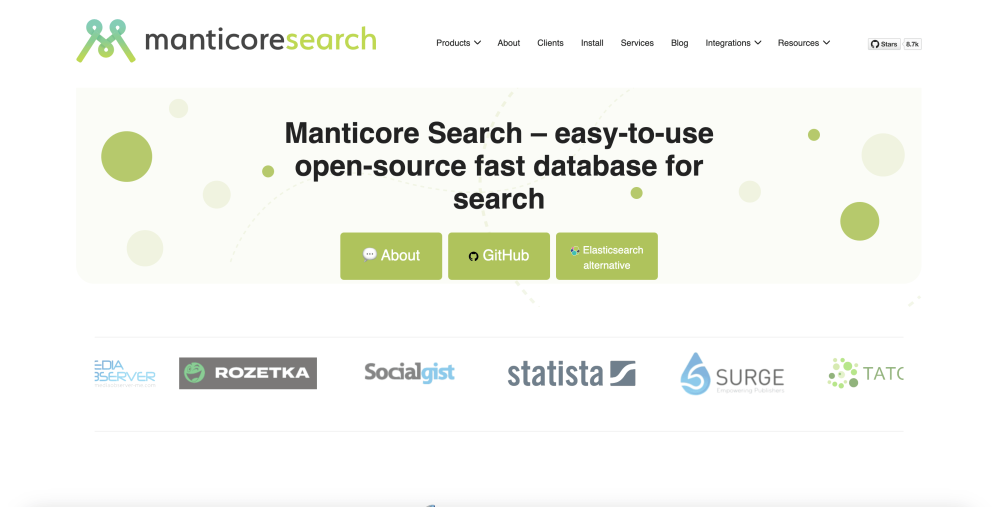
Continuing with our list of Elasticsearch alternatives, the next tool is Manticore Search a simple, open-source, fast database for search. Manticore Search boasts that its solution is 4x quicker than Elasticserch for big data and 29x faster than Elasticsearch for log analytics. The solution is designed for simplicity, so in the majority of use cases, Manticore Search will operate effectively in default settings.
Pinecone

Pinecone is a managed vector database designed to handle high-dimensional vector data, which is essential for applications involving machine learning and artificial intelligence. It provides a scalable, efficient, and easy-to-use platform for storing, indexing, and querying vectors, facilitating tasks such as similarity search, recommendation systems, and anomaly detection.
Weaviate

Weaviate is another cloud-native vector search engine built to manage and query high-dimensional vector data efficiently, but Weaviate differs from Pinecone as the solution is open-source. With this tool, you can enhance search experiences by merging vector and keyword techniques. Also, you can utilize your own vectors or choose one of Weaviate's out-of-the-box modules with support for vectorization.
Solr
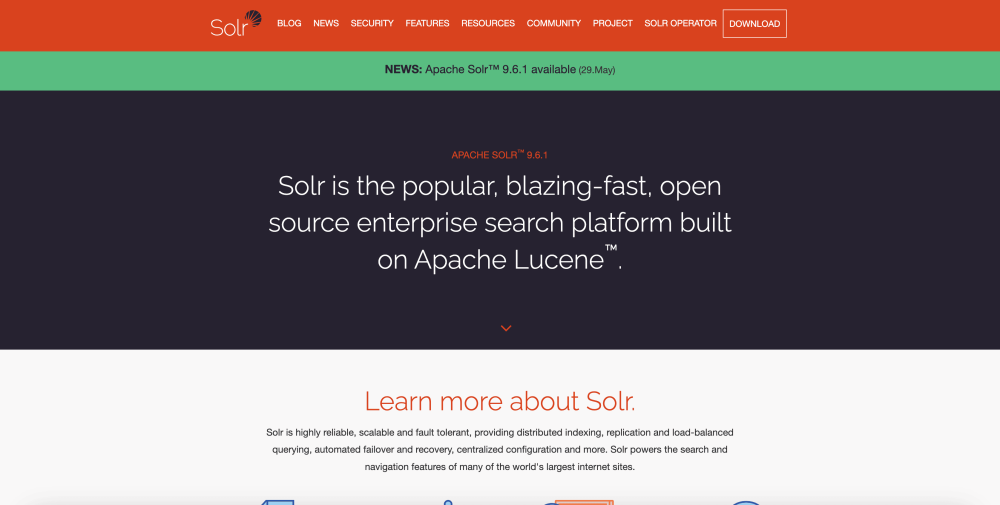
Solr is an enterprise-grade, open-source search platform based on Apache Lucene, offering robust indexing, search, and analytics capabilities. It enables full-text search, faceted search, and geospatial search on large datasets with very high flexibility and fault tolerance. As well as this Solr includes near real-time indexing, dynamic clustering, comprehensive RESTful APIs, and extensible plugin architecture for custom functionality.
Sphinx
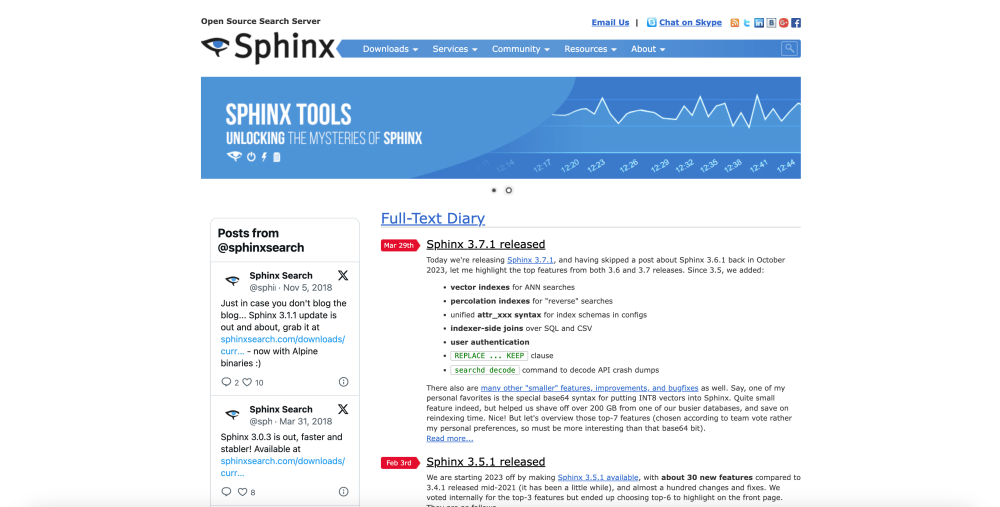
Sphinx Search is an open-source, full-text search server. It is developed under the hood of high performance, supporting systems' scalability. It can integrate natively with SQL databases and support either standalone or distributed search configurations. Sphinx resides on fast indexing, real-time indexing updates, advanced querying by full-text and attribute-based searches, and integration with popular programming languages via its APIs.
If you've enjoyed this article why not read The Top OpenSearch Best Practices for Success or The Leading OpenSearch Training Resources next?
